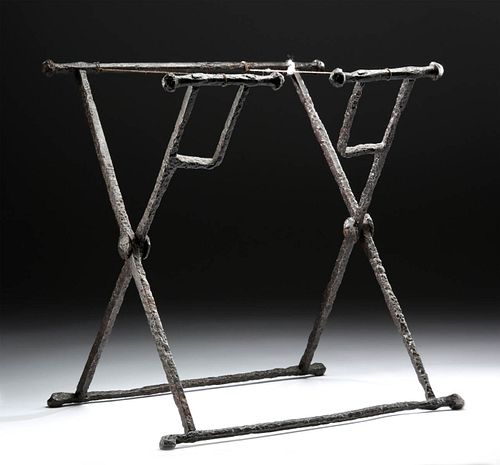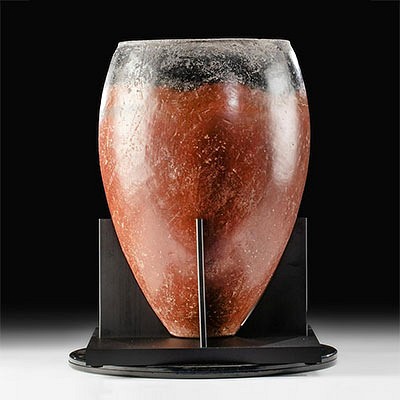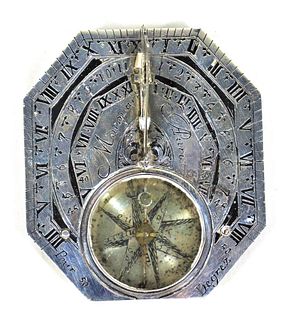Roman Iron Folding Chair, for Military Officer
Lot 37
About Seller
Artemis Fine Arts
686 S Taylor Ave, Ste 106
Louisville, CO 80027
United States
Selling antiquities, ancient and ethnographic art online since 1993, Artemis Gallery specializes in Classical Antiquities (Egyptian, Greek, Roman, Near Eastern), Asian, Pre-Columbian, African / Tribal / Oceanographic art. Our extensive inventory includes pottery, stone, metal, wood, glass and textil...Read more
Categories
Estimate:
$35,000 - $52,500
Absentee vs Live bid
Two ways to bid:
- Leave a max absentee bid and the platform will bid on your behalf up to your maximum bid during the live auction.
- Bid live during the auction and your bids will be submitted real-time to the auctioneer.
Bid Increments
| Price | Bid Increment |
|---|---|
| $0 | $25 |
| $300 | $50 |
| $1,000 | $100 |
| $2,000 | $250 |
| $5,000 | $500 |
| $10,000 | $1,000 |
| $20,000 | $2,500 |
| $50,000 | $5,000 |
| $100,000 | $10,000 |
| $200,000 | $20,000 |
About Auction
By Artemis Fine Arts
Oct 8, 2020
Set Reminder
2020-10-08 10:00:00
2020-10-08 10:00:00
America/New_York
Bidsquare
Bidsquare : Exceptional Antiquities, Asian, Ethnographic
https://www.bidsquare.com/auctions/artemis-gallery/exceptional-antiquities-asian-ethnographic-5796
Museum-worthy examples of Egyptian, Greek, Roman, Etruscan, Near Eastern, Far East / Asian, Pre-Columbian, African / Tribal,Oceanic, Native American, Spanish Colonial, Russian, Fossils, Ancient Jewelry, Fine Art, so much more! Artemis Fine Arts info@artemisgallery.com
Museum-worthy examples of Egyptian, Greek, Roman, Etruscan, Near Eastern, Far East / Asian, Pre-Columbian, African / Tribal,Oceanic, Native American, Spanish Colonial, Russian, Fossils, Ancient Jewelry, Fine Art, so much more! Artemis Fine Arts info@artemisgallery.com
- Lot Description
Late Roman, Imperial Period, ca. 1st century CE. An iron folding chair or stool created for an esteemed military officer or high official that represents the tradition of ancient Italian command insignia. The X-form folding chair/stool has one long and two short seat rails with support rails across the bottom, flat feet, and round knobbed finials at the corners of the seat rails and also at each side of the hinge of the X form. Such chairs, known as "sella," were used as status symbols and markers of command during the Etruscan and early Roman periods. By the Roman Republican and Imperial periods, the folding chair, known as the "Curulian chair," together with the fasces, constituted essential insignia of consuls, censors, praetors, and aediles. This type is an iron field chair, referred to as "sella castrensis" or a "camp stool," that was customarily used by military authority - usually reserved for the commanders in the field. Size: dimensions when open 14.5" L x 18.125" W x 19.25" H (36.8 cm x 46 cm x 48.9 cm)
One can find depictions of this chair type on a number of ancient Roman coins. One example depicts the Emperor Caligula standing left on a dais, addressing troops in an event known as an adlocutio cohortium (address to the cohorts), with the sella castrensis behind him (Gaius (Caligula). AD 37-41. AE Sestertius (27.99 g, 6h). Rome mint. Struck AD 37-38.)
A Roman iron and bronze folding stool dating to the 2nd century CE sold for USD 45,600 at Christie's New York (Antiquities, Sale 1531, 8 June 2005, lot 172). A Roman bronze stool dating to the 2nd century CE sold for USD 27,485 at Christie's New York (Antiquities, Sale 1163, 12 December 2002, lot 247).
Provenance: private J.H. collection, Beaverton, Oregon, USA; ex-Sands of Time, Washington, D.C., USA; ex-private German collection, owned since the 1960s, purportedly excavated from a Roman fort in Germany, thereafter with the Living Torah Museum, Brooklyn, New York, USA where it was purportedly exhibited 2006-2014.
All items legal to buy/sell under U.S. Statute covering cultural patrimony Code 2600, CHAPTER 14, and are guaranteed to be as described or your money back.
A Certificate of Authenticity will accompany all winning bids.
We ship worldwide and handle all shipping in-house for your convenience.
#149720Cleaned and professionally conserved. Missing leather or fabric seat that would have been attached to the top, and presenting expected age wear with old nicks and abrasions, but otherwise excellent with rich patina that has developed over the ages.Condition
- Shipping Info
-
All shipping is handled in-house for your convenience. Your invoice from Artemis Gallery will include shipping calculation instructions. If in doubt, please inquire BEFORE bidding for estimated shipping costs for individual items.
-
- Buyer's Premium



 EUR
EUR CAD
CAD AUD
AUD GBP
GBP MXN
MXN HKD
HKD CNY
CNY MYR
MYR SEK
SEK SGD
SGD CHF
CHF THB
THB














